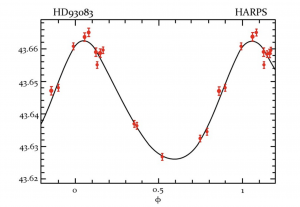“2021年IOAA理论第6题-马孔多与梅尔基亚德斯”的版本间的差异
Jingsong Guo(讨论 | 贡献) (创建页面,内容为“==英文题目== ==中文翻译== ==解答==”) |
(→英文题目) |
||
| 第1行: | 第1行: | ||
==英文题目== | ==英文题目== | ||
| + | In 2019, as a part of the NameExoWorlds campaign of the International Astronomical Union, Colombia was granted an opportunity to select a name for the star HD 93083 and its planetary system. HD 93083 is a 𝐾 − 𝑡𝑦𝑝𝑒 dwarf star and has one extrasolar planet orbiting it. Today they are officially known as Macondo (star) and Melquiades (planet), from the literary ideas of the Colombian writer Gabriel García Márquez. | ||
| + | |||
| + | This star has an effective temperature of 4995 K and an apparent visual magnitude of 8.3. As per GAIA DR2, the parallax for Macondo is 35.03 milliarcseconds. You may assume the orbit of Melquiades is perfectly circular. In the figure you can see the plot of radial velocity of Macondo with respect to the phase | ||
| + | [[文件:20221005122426.png|缩略图|Radial velocity of Macondo (Y-axis in $$km s^{-1}$$) as a function of the phase (X-axis).]] | ||
| + | |||
| + | |||
| + | 6.1 Find the wavelength (𝑖𝑛𝑛𝑚) of peak emission for Macondo in its rest frame (i.e., ignoring Doppler shifts).(2.0pt) | ||
| + | |||
| + | 6.2 Find the distance of this system from the Earth (in parsecs) and the absolute visual magnitude ($$M_{V} $$ ) of the star.(2.0pt) | ||
| + | |||
| + | 6.3 Calculate the mean radial velocity of Macondo (in $$km s^{-1}$$).(2.0pt) | ||
| + | |||
| + | 6.4 Calculate the orbital velocity (in km/s) of Melquiades ($$\upsilon _{p}$$), if mass of the star ($$m_{p} $$) is $$0.7 M_{\odot } $$ and the mass of exoplanet ($$m_{p} $$) is $$7\times 10^{26} kg$$. Assume that the orbital plane of the system is edge-on with respect to our line-of-sight.(2.0pt) | ||
| + | |||
| + | 6.5 Find the orbital radius of Melquiades (in 𝑎𝑢) and its orbital period (in days).(4.0pt) | ||
==中文翻译== | ==中文翻译== | ||
==解答== | ==解答== | ||
2022年10月5日 (三) 12:33的最新版本
英文题目
In 2019, as a part of the NameExoWorlds campaign of the International Astronomical Union, Colombia was granted an opportunity to select a name for the star HD 93083 and its planetary system. HD 93083 is a 𝐾 − 𝑡𝑦𝑝𝑒 dwarf star and has one extrasolar planet orbiting it. Today they are officially known as Macondo (star) and Melquiades (planet), from the literary ideas of the Colombian writer Gabriel García Márquez.
This star has an effective temperature of 4995 K and an apparent visual magnitude of 8.3. As per GAIA DR2, the parallax for Macondo is 35.03 milliarcseconds. You may assume the orbit of Melquiades is perfectly circular. In the figure you can see the plot of radial velocity of Macondo with respect to the phase
6.1 Find the wavelength (𝑖𝑛𝑛𝑚) of peak emission for Macondo in its rest frame (i.e., ignoring Doppler shifts).(2.0pt)
6.2 Find the distance of this system from the Earth (in parsecs) and the absolute visual magnitude ($$M_{V} $$ ) of the star.(2.0pt)
6.3 Calculate the mean radial velocity of Macondo (in $$km s^{-1}$$).(2.0pt)
6.4 Calculate the orbital velocity (in km/s) of Melquiades ($$\upsilon _{p}$$), if mass of the star ($$m_{p} $$) is $$0.7 M_{\odot } $$ and the mass of exoplanet ($$m_{p} $$) is $$7\times 10^{26} kg$$. Assume that the orbital plane of the system is edge-on with respect to our line-of-sight.(2.0pt)
6.5 Find the orbital radius of Melquiades (in 𝑎𝑢) and its orbital period (in days).(4.0pt)
